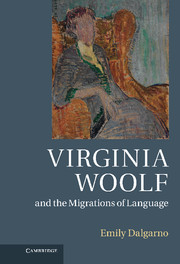Book contents
- Frontmatter
- Contents
- Preface
- Abbreviations
- The migrations of language: introduction
- Chapter 1 Translation and ethnography in “On Not Knowing Greek”
- Chapter 2 Antigone and the public language
- Chapter 3 Tolstoy, Dostoyevsky, and the Russian soul
- Chapter 4 Proust and the fictions of the unconscious
- Chapter 5 Translation and iterability
- Chapter 6 Assia Djebar and the poetics of lamentation
- Conclusion
- Bibliography of works cited
- Index
Chapter 3 - Tolstoy, Dostoyevsky, and the Russian soul
Published online by Cambridge University Press: 07 October 2011
- Frontmatter
- Contents
- Preface
- Abbreviations
- The migrations of language: introduction
- Chapter 1 Translation and ethnography in “On Not Knowing Greek”
- Chapter 2 Antigone and the public language
- Chapter 3 Tolstoy, Dostoyevsky, and the Russian soul
- Chapter 4 Proust and the fictions of the unconscious
- Chapter 5 Translation and iterability
- Chapter 6 Assia Djebar and the poetics of lamentation
- Conclusion
- Bibliography of works cited
- Index
Summary
Of all those who feasted upon Tolstoy, Dostoyevsky, and Tchekhov during the past twenty years, not more than one or two perhaps have been able to read them in Russian. Our estimate of their qualities has been formed by critics who have never read a word of Russian, or seen Russia, or even heard the language spoken by natives; who have had to depend, blindly and implicitly, upon the work of translators.
(E4: 182)Woolf’s reading of Tolstoy as a novelist/historian enabled the revisionist view of history that is apparent in the structure of Mrs. Dalloway and The Years. Her interest in the Russian “soul” on the other hand, in the works of Dostoyevsky and Chekhov, is manifested throughout her stories and novels, and the study of soul in the diaries poignantly records her spiritual hunger. During the period 1912–25 Woolf learned some Russian, collaborated on a translation, and as a publisher and essayist helped to promote the sales of Russian works. Whereas most members of Woolf’s class read French and were familiar with other western European languages, the sudden popularity of Russian fiction in the translations of Constance Garnett opened new paths of circulation in a language that was totally foreign to most English readers. Woolf began reading the Russian novel in 1912 on her honeymoon, when on the recommendation of Lytton Strachey she read a French translation of Crime and Punishment, Le crime et le châtiment. As Garnett’s translations gradually became available, Woolf broadened her reading list to include not only Dostoyevsky, but Tolstoy, Turgenev, and Chekhov, and she read as well some lesser-known writers, Aksakov and Bunin. Leonard gave her a copy of Garnett’s translation of The Brothers Karamazov in 1912; she presented him with The Idiot in 1913, and The Insulted and the Injured in 1915.
Russian literature boosted the fortunes of the Hogarth Press during the period 1920–3. Sales of Russian writers overshadowed all previous publications save those by T. S. Eliot and Virginia. Laura Marcus in her analysis of the activities of the Press stressed the heterogeneity of its publications. Although many small presses sprang up in England in the 1920s, most lasted only a few years. That the Hogarth Press survived, and so freed Woolf from the conventional taste of commercial publishers, was owing in part, according to Leonard, to broadening their list, so that in addition to publishing the work of their friends, they began to include translations. Leonard and Virginia were tutored in Russian by S. S. Koteliansky, who brought Russian works to the Press, and they learned enough to collaborate with him on seven Hogarth translations. After the Russian Revolution, sales of Tolstoy’s work outstripped those of other Russians, and the Hogarth Press published four works by and about Tolstoy. Leonard wrote of the translation of Gorky’s Reminiscences of Tolstoy (1920) “that the success of Gorky’s book was really the turning point for the future of the Press and for our future.” In fact eight of the twenty-seven publications of the Press from its founding to 1923 were Russian translations. They together with Kew Gardens decided them “to allow the Press to expand and become professional, respectable, and commercial.” As a book reviewer Woolf contributed to this success. Her reviews of books by and about Tolstoy, Dostoyevsky, and Turgenev, from 1912–25, helped to create an audience for Russian literature. It is significant that these works of translation were outside the purview of the university dons who had so vexed the problem of translating classical texts.
- Type
- Chapter
- Information
- Virginia Woolf and the Migrations of Language , pp. 69 - 96Publisher: Cambridge University PressPrint publication year: 2011



